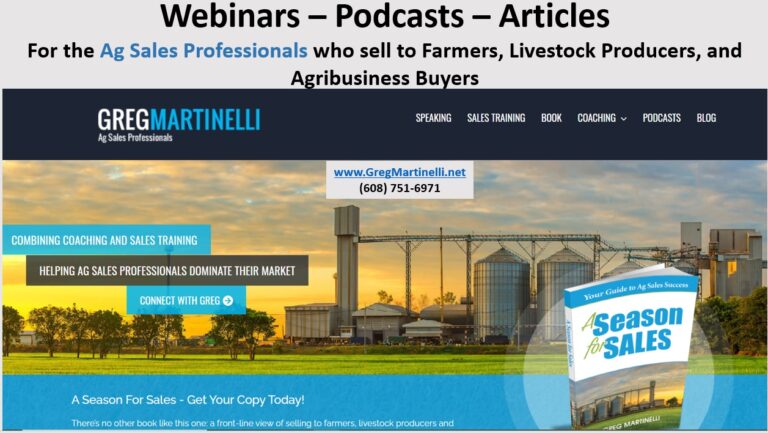The ethical challenges of selling in agribusiness
“You do know that’s metric tons, right?” Don asked me. With that question, my world spiraled into a state of panic. Things were going great. After my first year as a trainee, I had the exciting opportunity to work in the corporate office, helping to manage the feed ingredient positions all over the world. Working just outside the president and vice president’s office, me and another trainee worked from our cubicles to add up the dozens of ingredients and commodity positions to make sure we were hedged properly. In this particular case, I was pretty excited as I walked into Don’s office to tell him about the “hot deal” I got on a boat of soybean meal delivered to South America. Along with managing a large portion of the US business, Don also managed the entire continent of South America. I always wondered how that went in family discussions at the holidays…. “And what do you do, Don?”…..”Oh, I manage a continent?”
Anyway, back to my dilemma. “Don, I just got that boat of soybean meal locked in. 10,000 tons and got them to drop it $5!” I confidently informed Don. “Nice job, Greg. That’s $50,000 in one hour of negotiating. Don’t forget to do that every time.” Don said sort of jokingly but actually serious. And just as I was about to walk out of his office, he dropped that horrifying question on me… “You do know that’s in metric tons, right?”
In a millisecond, I knew I had a problem because I had no clue it was metric tons. This meant I was off on my hedge by oh… roughly 1,000 tons. Even though Don was not known for being a fire-first-ask-questions later kind of VP, there was really high turnover in the trainee position that I was in. We all thought it was because trainees made mistakes and then were fired quickly. What we found out is that it really was for making mistakes. However, it was for making the same mistakes over and over or trying to cover up the mistakes. There’s an old saying, – It’s not the crime that gets you, it’s the cover-up.
Figuring I was probably going to go home that day and pack up to move to another job, I answered Don with the truth, which, by the look on my face, he already knew anyway. The whole incident ended with a short discussion about how to correct it and not do it again. He didn’t even want to know how much hedge slippage there was (loss from hedging after the price was set) and neither did I.
Selling in agribusiness will present you with a multitude of moral challenges. They typically revolve around money; making more of it, not losing it, someone taking it, etc. Taking the low road seems so easy when no one is looking but typically becomes very difficult once the ethical dilemma comes to light.
Not that getting caught is the guide for your decision, but this is often what guides those around you. They will present this ethical challenge as a good opportunity because “no one will ever know”. Here’s the problem with that reasoning. You will know. And there’s no one more important than you in these situations because the ethics and morals they are challenging are yours.
In one of my early selling days, my dealer asked me to sell and take a personal gain on a product he was selling. As a company rep, I was on sales calls to sell my company’s products through dealers. My dealer was asking me to sell for him while out there selling for my company.
In numerous occasions, I was asked to sell customers a medicated feed that was not approved for the animal they were feeding it to. Animal medicine has to be approved by the FDA for each species. If it’s approved for pigs, you can only feed it to pigs. You can’t sell it to a turkey producer, even if it is safe and effective on turkeys. When informing customers of this, often their response was, “well just sell me pig feed then”.
Internally, there were numerous times when mistakes were made in product manufacturing or delivery to a customer. Sometimes the customer didn’t even know it. The choice was either to tell them or not. Telling them would involve a lot of extra work on my part to remove the wrong product and send out the correct one. It would also run the risk of upsetting the customer or losing them. The easy road would be to not say anything and see if it would go unnoticed by the customer.
Smaller ethical challenges came up on a daily basis. I had a customer that really liked me but didn’t like our customer service person. He would blame her for everything that went wrong: missed orders, product outages, incorrect pricing on an invoice, etc. As the salesperson in this situation, do you allow the customer to blame someone else like our customer service person or do you let them know that it was actually you who forgot to call the order in?
Maybe it’s even smaller than that. You agree to a meeting you know you can’t make. You agree to a product delivery date you know your company can’t deliver by. Again, the easy road is to avoid the immediate conflict and take the order. However, this seemingly small moral slip costs you in more ways than you think. First and foremost, you are not true with yourself. Secondly, you establish a level of trust with your customer when you do this. While this might be a small order and not appear to be a big deal, your customer is mentally logging a trust level with you. When it comes to the bigger issues in selling, this trust level will come into play. Now that stakes are higher, your previous small ethical challenges will weigh on your customer’s mind.
If you have been on-territory for any length of time, I’m sure some of these moral challenges have come your way. The decision to take the more difficult high path or easy low path is totally yours. Your choices may lead to sales and success or disappointment in yourself and being fired. Just remember, whichever path you choose, you will always know and have to live with it. So, choose wisely.
One more thing: Talk about these topics with your peers, coworkers, and manager. Every agribusiness has its typical ethical challenges. In animal and crop production, you are part of the food chain, which includes medications, insecticides, herbicides, chemicals, safety issues, risk, etc. Discussing some of the common challenges can help sort out how you make your decision when confronted with it. If you are a manager, this becomes even more critical. You not only have an ethical challenge to deal with but a liability issue. But, that’s a story for another day when we will talk about the high cost of not training on ethical issues and claiming ignorance of unethical behavior.




